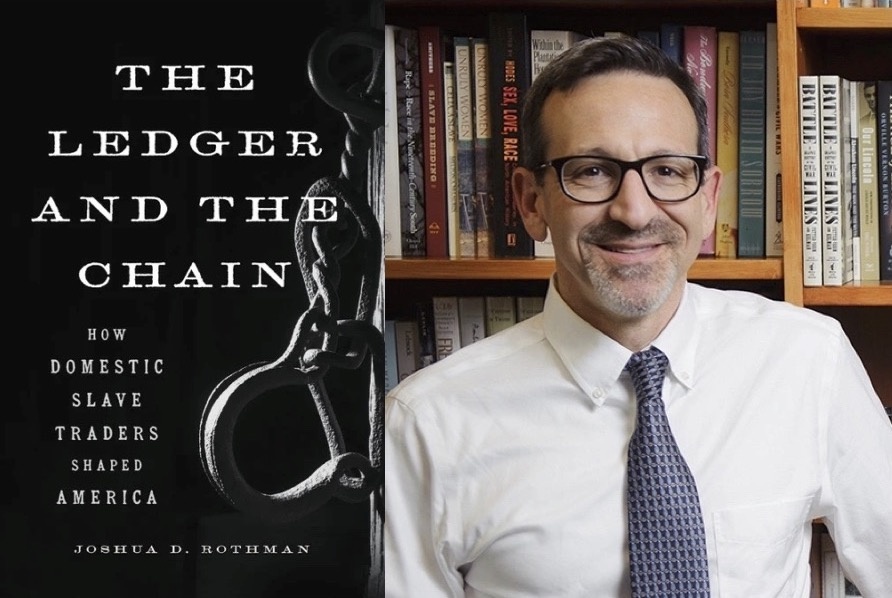REVIEW: The brilliance of Rothman's 'The Ledger and the Chain'

"The Ledger and the Chain: How Domestic Slave Traders Shaped America," is on historian Timothy B. Tyson's short list of the best history books ever written. It's by Joshua D. Rothman, chair of the department of history at the University of Alabama and author of two previous prize-winning books, "Flush Times and Fever Dreams: A Story of Capitalism and Slavery in the Age of Jackson" and "Notorious in the Neighborhood: Sex and Families Across the Color Line in Virginia, 1787-1861." Rothman lives in Birmingham and Tuscaloosa, Alabama. (Photos via Basic Books.)
I recently read Joshua D. Rothman's "The Ledger and the Chain: How Domestic Slave Traders Shaped America." This is one of the best history books that I have ever read. It is the story of the domestic slave trade that built this nation, perhaps as much as the Atlantic slave trade's death machine. It is business history, among other things, with a deeply human sweep, the slavers and the enslaved, the merciless merchants and the human merchandise. I know that the historiography has been running in this general direction for some time, and that much ground has been broken, including some amazing books by Walter Johnson and Ed Baptist and others; Rothman's book takes its rightful place on that shelf.
But nobody has done quite what Rothman accomplishes in these pages. The story of slavers and enslaved becomes the story — how these shrewd, ambitious and heedless men transformed the system of slavery into this industrial, vertically integrated, and vastly underwritten juggernaut — into Mississippi Rivers of money, into a real New World, into a savage empire that still stalks our nation, and into human pain without measure.
But it is not just the saga of Franklin and Armfield and Ballard, and their other slaver colleagues, but also the stories, fully elaborated, of Black humanity in this borning nation. In the hardest stories, and I am thinking here of the so-called "fancy trade," the sexual slavery endemic to the system, Rothman's research and storytelling illuminates the stories of Black women I had never met in the literature, like Arvenia White and Susan Johnson, for example, and Virginia Boyd, who writes to Ballard to ask what he thinks of "the father of my children to sell his own offspring," and — perhaps the best question that arises from this book — what it might mean "that any free born American would brand his character with such stigma as that." Martha Sweart, Martha Sweart, I will never forget her. The storytelling here is about as good as historians get.
This is how I think history must be written — up close and personal, looking the nightmare that must be unveiled squarely in the eye, with a clear moral sensibility but without one word of needless hand-wringing or any maudlin gestures.
In teaching African American history since 1994, I had pieced together the breeding grounds of the played-out plantations of the upper South and what I thought was the whole sweep of this vastly lucrative domestic migration, with Andrew Jackson clearing the Creek, the Cherokee, Chickasaw, Choctaw, and Shawnee, et al. out of the way of the vast swing of this scimitar of enslavement. I knew the upper South's patricians' filthy fortunes made enslaving people torn from their families and shipped to some of the world's richest farmland. But I did not know the half of it, really, and told it way too small and way too mechanistic. I could not yet know what this brilliant book teaches so magnificently. This makes the horrific tale both concrete and specific, while it illuminates the whole hellscape, literal and societal and human, of that unspeakable tale.
This is how I think history must be written — up close and personal, looking the nightmare that must be unveiled squarely in the eye, with a clear moral sensibility but without one word of needless hand-wringing or any maudlin gestures. Without any sense that being better than these cold-hearted traders in human flesh makes anyone smell like a rose.
This book has characters, and the lives and labors of those characters transform the South and the nation and the world, for that matter. And when I say that, I am not strictly referring to Franklin, Armfield and Ballard, our slavers, but also to the enslaved human beings whose voices Rothman has located and gracefully folded into the center of the saga, with appropriate acknowledgment of how much can't be known of their predicaments, but with a strong grasp of everything that had to be the case, on top of this vast research that nails down much of it with plenty of specific clarity.
In the skillful and accurate use of characters to carry the larger story, "The Ledger and the Chain" rather reminds me of Stephen Kantrowitz's "More Than Freedom: Fighting for Black Citizenship in a White Republic, 1829-1889," also featured on the short list of my favorite history books.
In "The Ledger and the Chain," we see unspeakable inhumanity and suffering, and the deeply personal corruption and stunningly offhand cruelty that it made central to the meaning of this commerce in human beings. Rothman paints them vividly, but with all the drama coming from the stories themselves, the viciousness and amoral rot of it all, the depths to which human beings can sink to exploit one another. Yet he never overplays his historian's hand. The love and compassion, for lack of better words, that resonate in his telling of these ghastly human tales, unfolds entirely without moralistic braying or any kind of pornography of horror.
He does not spare the men who did this nor the reader who might prefer a story way different from the one he is telling — the paternalist narratives "just like family," my grandmother used to say — and yet does not render any of the characters less than fully human. Monstrous, yes, but fully human, which is not a stretch; rendering someone as a human is not a large claim, given the record of our species.
Robert Frost said that he hoped that he would write a few poems "that would be hard to get rid of." I don't know when and how America can ever get rid of "The Ledger and the Chain." Its hooks are set so deeply, so skillfully, that I suspect we will have to digest those hooks to ever be rid of them. After which, perhaps, in some faraway and unimaginable world, we won't need them so much. That will not be soon.
Tags
Timothy B. Tyson
Timothy B. Tyson is a senior research scholar at the Center for Documentary Studies at Duke University and Duke Divinity School.
